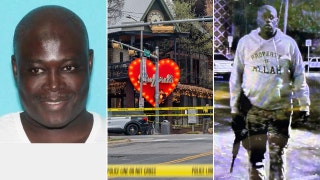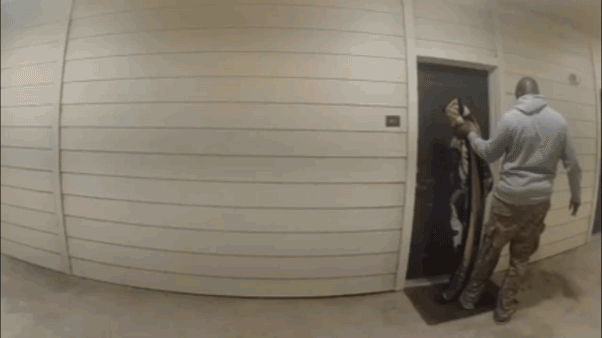NEW YORK – Psychologist Kathryn Faughey had never treated the schizophrenic man accused of murdering her with a meat cleaver in her office. He would later tell police he was targeting her office mate in a bizarre robbery plot he imagined would help him get his mother out of a nursing home.
Paranoid and prone to delusions that he's the Messiah and heard the devil speak to him, David Tarloff had repeatedly been hospitalized for his mental problems, according to his lawyers and psychiatrists. He was arrested on charges of punching a security guard a week and a half before Faughey's 2008 slaying, but was released after a psychiatrist said he didn't need further treatment.
Jury selection is to start Tuesday in Tarloff's trial. He acknowledges committing the attack but plans an insanity defense, said his lawyer, Brian Konoski.
The case has highlighted the rare but sometimes grave dangers of a profession dedicated to helping unstable people. It also reflects the difficulties of assessing and treating serious mental illness, and the legal challenges of mounting an insanity defense.
It has long been uncertain whether Tarloff ever would be tried. He was considered mentally unfit for trial for about a year and has sometimes refused to talk to his lawyer.
"We're relieved that it's finally happening," said Owen Faughey, one of the victim's six siblings; some attended each of Tarloff's court dates. But, he added, "it's going to be very tough emotionally on all of us."
Faughey, 56, specialized in helping people with relationships. She also played guitar — even attending a camp for enthusiasts — and contributed to causes related to her family's native Ireland.
Tarloff, 42, began suffering psychiatric problems as a college student. They grew into an inner world of fixation, fear and hallucinations: seeing the "eye of God" on a kitchen floor and the word "Satan" spelled in his mind, hearing God and the devil speaking to him, according to Konoski.
His relatives strove to get and keep him in hospitals, but the facilities kept releasing him, his brother has said.
That's a common, if frustrating, cycle for families of the mentally ill, sometimes fueled by insurance limits and laws that make it difficult to treat patients against their will, said Ron Honberg, who oversees legal affairs for the National Alliance on Mental Illness.
By February 2008, Tarloff was an erratic and lonesome figure, despondent over his mother's move to a nursing home.
He set out to get $50,000 to spirit her away to Hawaii, he told police in a video-recorded statement. He decided to rob Faughey's office mate, psychiatrist Dr. Kent Shinbach.
Shinbach was involved in Tarloff's first hospitalization, 17 years earlier. Tarloff told police he'd harbored a grudge against the psychiatrist and figured he was rich.
Tarloff called ahead to make sure Shinbach would be in his Manhattan office on the evening of Feb. 12, 2008, but he told police he didn't realize Faughey would be there.
"I didn't go there to hurt anybody," Tarloff said. He said he reacted out of a belief Faughey "was going to kill me."
Faughey was slashed 15 times, and Shinbach was seriously hurt as he tried to save her, authorities said. Shinbach declined to comment on the case.
The attacker fled, but investigators ultimately matched Tarloff's palm prints with some found on a suitcase — filled with women's clothing and adult diapers — left in the building. Another bag found nearby held rope, duct tape and knives not used in the attack, police said.
Tarloff is arguing that he shouldn't be held criminally responsible because of his mental illness. His defense hinges on persuading jurors not only that he has a serious psychiatric disorder but also that he didn't know what he was doing was wrong.
"Everything about his thought process was so bizarre — so crazy — that the proof in the case shows he was legally insane at the time of the commission of the offenses," Konoski said in an e-mail message this week.
Not so to Owen Faughey.
"He didn't necessarily plan to kill our sister, but he packed a bag with knives, and he had a plan, and this certainly shows he was cognizant of what he was doing," he said.
If acquitted because of insanity, Tarloff will be held indefinitely in a mental institution; a judge and psychiatrists would have to approve his release. If convicted, he faces up to life in prison.
Insanity defenses are rare, offered for less than 1 percent of felonies nationwide and successful only about a quarter of the time, experts say.
There have been some notorious successes, perhaps most so the case of John Hinckley Jr., who said he tried to assassinate President Ronald Reagan in 1981 to impress actress Jodie Foster.
But insanity defenses also have failed in some high-profile cases. The U.S. Supreme Court upheld the conviction of Eric Clark, a schizophrenic Arizona teenager whose lawyer said Clark believed the police officer he killed in 2000 was a space alien.
Faughey's death focused attention on patient violence against mental health providers, but it has long been a concern in the profession. Surveys suggest about 15 to 20 percent of psychologists are assaulted by a patient at some point in their careers, said Phil Kleespies, a Boston psychologist who co-chaired an American Psychological Association group that examined patient violence. Studies suggest patient attacks are even more common among psychiatrists, who are psychologists' medical-doctor colleagues.
Mostly, the wounds are minor. But Faughey's slaying followed others, including the 2006 killing of a federal mental health official, psychiatrist Dr. Wayne Fenton. A patient beat him to death during an emergency consultation at his private practice in Bethesda, Md.
Techniques to keep therapists safe include installing office panic buttons and positioning themselves between a patient and the door. But they have to balance security concerns with therapeutic needs for an atmosphere of openness and trust.
"You want it to be a human environment, not like a room in a prison," Kleespies said.









































